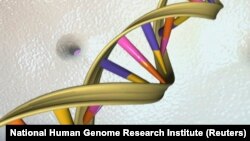For the first time since the start of the AIDS epidemic, it appears scientists are on the verge of a cure.
Antiretroviral drugs do such a good job of suppressing the AIDS virus and keeping it from reproducing, that levels of HIV are virtually undetectable in infected individuals.
But the memory of the virus always remains in human T-lymphocytes — immune system cells that are the target of the virus. These reservoirs can spring to life and begin churning out the AIDS pathogen the moment antiretroviral drugs are stopped.
Now, researchers appear to have found a way to eliminate the viral reservoirs from cells altogether, so they can never reproduce.
Scientists have engineered a gene-editing technique called CRISPR/Cas9 to cut out the viral DNA, effectively curing the disease.
"The excision molecules that we have developed inactivate a large population of … the cells containing the virus and then it's basically dropped — the virus replication — almost 90 percent in … patients or even [in] infected cells in the lab," said Kamel Khalili, lead researcher and chair at the Department of Neuroscience at Temple University School of Medicine in Philadelphia, Pennsylvania.
Khalili and his colleagues have not actually cured any patients, but they have scrubbed infected human T-cells in the laboratory of any trace of HIV.
The work was described in the journal Scientific Reports.
Khalili believes the gene-editing technology has the potential to cure AIDS.
"It's an exciting time and the reason is the technologies are available and the methods are in place and our knowledge has increased and hopefully there will be funding to take us toward this exciting moment toward the cure of the disease," he said.
Khalili predicts human clinical trials could get underway in two to three years.




